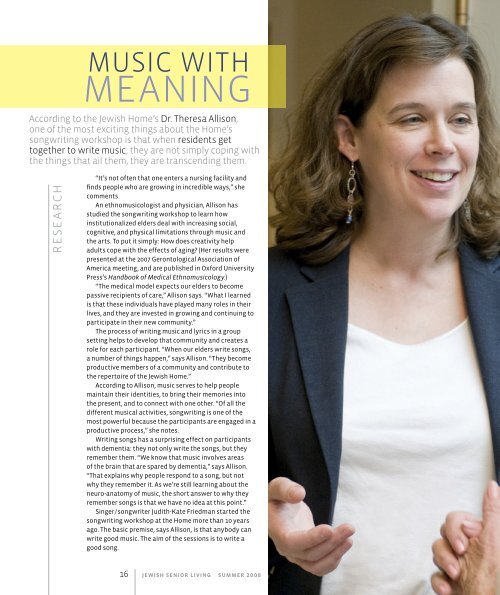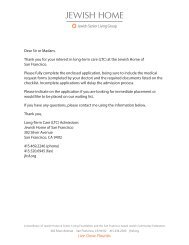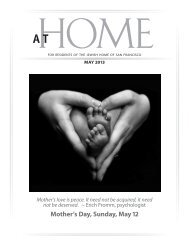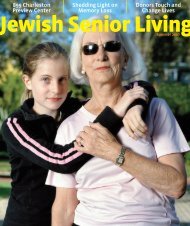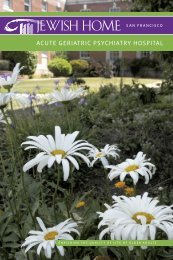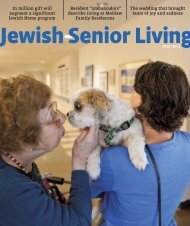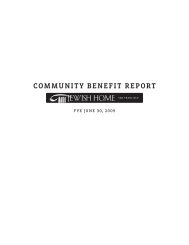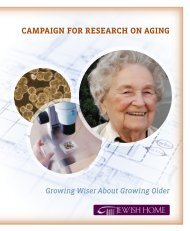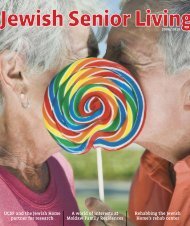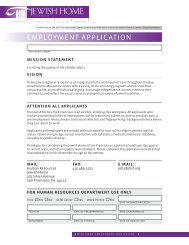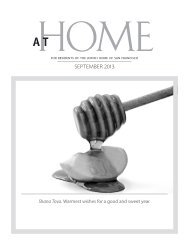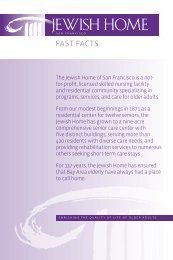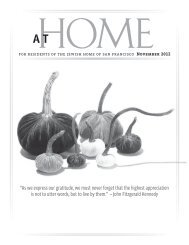Community beyond construction at 899 Charleston Songwriting ...
Community beyond construction at 899 Charleston Songwriting ...
Community beyond construction at 899 Charleston Songwriting ...
- No tags were found...
Create successful ePaper yourself
Turn your PDF publications into a flip-book with our unique Google optimized e-Paper software.
MUSIC WITHMEANINGAccording to the Jewish Home’s Dr. Theresa Allison,one of the most exciting things about the Home’ssongwriting workshop is th<strong>at</strong> when residents gettogether to write music, they are not simply coping withthe things th<strong>at</strong> ail them, they are transcending them.research“It’s not often th<strong>at</strong> one enters a nursing facility andfinds people who are growing in incredible ways,” shecomments.An ethnomusicologist and physician, Allison hasstudied the songwriting workshop to learn howinstitutionalized elders deal with increasing social,cognitive, and physical limit<strong>at</strong>ions through music andthe arts. To put it simply: How does cre<strong>at</strong>ivity helpadults cope with the effects of aging? (Her results werepresented <strong>at</strong> the 2007 Gerontological Associ<strong>at</strong>ion ofAmerica meeting, and are published in Oxford UniversityPress’s Handbook of Medical Ethnomusicology.)“The medical model expects our elders to becomepassive recipients of care,” Allison says. “Wh<strong>at</strong> I learnedis th<strong>at</strong> these individuals have played many roles in theirlives, and they are invested in growing and continuing toparticip<strong>at</strong>e in their new community.”The process of writing music and lyrics in a groupsetting helps to develop th<strong>at</strong> community and cre<strong>at</strong>es arole for each participant. “When our elders write songs,a number of things happen,” says Allison. “They becomeproductive members of a community and contribute tothe repertoire of the Jewish Home.”According to Allison, music serves to help peoplemaintain their identities, to bring their memories intothe present, and to connect with one other. “Of all thedifferent musical activities, songwriting is one of themost powerful because the participants are engaged in aproductive process,” she notes.Writing songs has a surprising effect on participantswith dementia: they not only write the songs, but theyremember them. “We know th<strong>at</strong> music involves areasof the brain th<strong>at</strong> are spared by dementia,” says Allison.“Th<strong>at</strong> explains why people respond to a song, but notwhy they remember it. As we’re still learning about theneuro-an<strong>at</strong>omy of music, the short answer to why theyremember songs is th<strong>at</strong> we have no idea <strong>at</strong> this point.”Singer/songwriter Judith-K<strong>at</strong>e Friedman started thesongwriting workshop <strong>at</strong> the Home more than 10 yearsago. The basic premise, says Allison, is th<strong>at</strong> anybody canwrite good music. The aim of the sessions is to write agood song.16 Jewish Senior Living summer 2008


